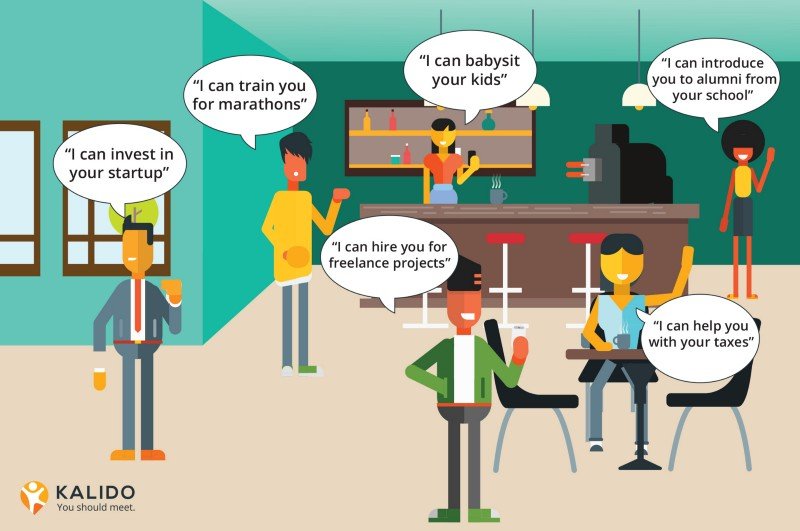
Kalido is built on a certain view of the world, and people. We believe that people want to make genuine connections with others, both online and in the real world. And we believe that only genuine connections can help people succeed in the real world. The only problem is, ‘networking’ has become synonymous with empty sycophancy, and something people actively avoid. So, we sat down with one of our co-founders, Ashvin Sologar, to chat about why networking isn’t working, and how Kalido aims to fix that.
Q: Why do you think networking in its current form is broken?
A: Well, firstly, the word ‘networking’ itself often has a dirty connotation, which is this idea that you only meet people to use them, or to get something from them. And that’s exacerbated when you go into a room full of people, and you have to somehow meet as many of them as possible, and figure out how they can be useful to you, or how you can ingratiate yourself to them. And if you take that into a digital context, people feel like they have to amass this huge network of digital connections, but often with no real purpose. This type of thinking encourages you to treat people like commodities — as rocks to add to your collection. But I don’t think that’s how the world actually works. I think people want to make genuine connections with other people.
I think networking today has both a noise problem and a conversion problem. First, the noise problem: you end up with hundreds or thousands of random people in your various social networks that you don’t care about. We mindlessly add people, and then never have anything to do with them again. These connections create noise in your network, making it harder to find the value. Then, there’s a conversion problem: when you do find someone interesting in your extended network, it’s often someone you haven’t spoken with in years, and there may be no easy way to turn that digital connection into a real world connection short of sending some sort of paid message that feels creepy to both parties.
Kalido addresses both of these issues. It encourages you to only add people you know and trust. Then, it lets you explore what all of those people (and all of the people they know) can provide, and what kind of skilled people they are looking for, so you can connect on the basis of a real need, not just because you read their CV, or because they want to ‘network’. After that, it makes due diligence simple, enables arranging and requesting introductions with a few taps, and provides a free, easy way to chat directly with someone else’s trusted connection before you decide to share your contact details. Finally, the Nearby function tells you when people are in your neighbourhood, making it easier to connect more often and strengthen your relationships in the real world, which sends a much stronger signal than liking someone’s photos in a feed, for example.
Q: You talk about digital contacts having to be ‘relevant’. What do you mean by that?
A: Let’s say, for example, I’m matched with ten people, and one of those people went to the same school as I did. Immediately, talking to that person provides more value, because they can introduce me or reconnect me to other people who went to my school, and I might be able to introduce them to other people they want to know. Instead of completely random connections, we’re giving you connections that you’re interested in at the outset. Either they have something in common with you (they went to the same school, or work in the same company or industry), or they do something you’re interested in. So, we’ve already provided some sort of filter that makes them more relevant. As part of our commitment to enabling opportunities for all, we also highlight people nearby who can provide different services, but if you’re not interested in meeting people with no connection to you, you can just disable or ignore that function.

And unlike other platforms, we don’t reduce people to job titles. We’re more interested in what someone actually does, than what they call themselves, because we think that gives you a much clearer picture of who they are. So, you might say you’re a psychologist. That’s great, but it means nothing to me, because I might have vague (and completely mistaken) ideas of someone lying on a couch telling you what they had for breakfast. Now, instead of telling me you’re a psychologist, you tell me what you actually do is provide trauma counselling for families after a crisis. That’s much more interesting to me. And if we previously worked at the same company, and also happen to know a bunch of the same people, you immediately become someone I want to get to know more. That’s what we mean by relevant. Digital connections that you’re actually interested in as people, not just as a name on your contact list.
Q: How does Kalido help me turn relevant digital connections into real world connections?
A: Well, we help you jump social hurdles. Hurdles that all of us will face at some point. Let’s say you walk into a room filled with new people, which we all do sometimes. What are the hurdles you have to get through? You have to get over your own fear. Then you need to get over the awkwardness of walking up to somebody, or walking into a group and interrupting the conversation. Then after you’ve overcome this initial awkwardness, you have to send out a bunch of feelers to figure out what can help you drive the conversation forward. We let you bypass all of that, and walk into a room already knowing something about someone that lets you immediately dive into a conversation that has legs.
You might know that the person you’re speaking to provides counselling at homeless shelters on weekends, for example. So, you can talk about the state of mental healthcare in the country. Or you might have gone to the same school a few years apart, so you can reminisce and share stories. Or you might know the same people, and learn something new about your own friends. Any of those are a much more comfortable way of having a conversation than trying to figure out what you have in common with a complete unknown.
There’s a future where you could think of Kalido as an augmented reality tool. Like those scenes in a movie where you walk into a room full of people, and see useful info about them projected over their heads. And any bit of that info can lead to all sorts of interesting conversations. And because this is Kalido, and we built it caring about privacy from the ground up, it’s also important to note that the information you see will only be information that people have chosen to publicly share, or choose to share with you because you have a trusted connection already.

So, what we do is create respectful, useful transparency. We help you understand something about someone: what they do or what they need; what their interests are; who they know in common — something to start a conversation. Success for us is constantly reducing the time it takes for you to start a meaningful discussion with someone.
Q: I can get info about my digital contacts on my other social media platforms. What makes Kalido any different?
A: Again, two things. Firstly, we believe that it’s up to us to provide value to you, instead of compelling you to continuously generate content for us, or for your channel of followers. And second, where other platforms tend to encourage embellishment and curation of your life, we encourage you to be as honest and genuine as possible, because that’s the only way you’ll get any real value when you actually start talking to someone in the real world.
So, let’s talk about the first point. Most social platforms require you to continuously generate content to be seen as alive. Keep posting, tweeting, liking, all day, every day. With Kalido, every once in awhile if you can provide something different, you might update that on your profile. Or you might be inspired by a Featured Provider around you. But nothing says ‘Oh, it’s been a week, you need to update your profile’ or ‘It’s been 8 hours, and no one has liked your post’. It’s not a frenetic zero value activity. Instead, it’s on us to continuously surface opportunities for you. For example, we’ll let you know which of your contacts are nearby, wherever you are. So, if you want to meet up for lunch, or drinks, or a quick business meeting, you can. We let you know who can provide a service you’re looking for, or who needs your services, to increase your professional opportunities. We show you your Kalido Community and Featured Providers nearby, so you can discover someone interesting when you have some downtime and want to browse something that won’t depress you. So, other platforms make you do a lot of work, for nothing really tangible in return. Whereas with Kalido, anything you do (like syncing your phonebook, or adding more services to your profile) helps you find better matches, and more real world opportunities.
The second difference is that Kalido helps you stay genuine. We’ve managed to combine both the professional and personal aspects of a person. And we’ve done it without requiring you to be pretentious or isolationist about it. Rather than creating a world where you build this little digital fortress, collecting ‘friends’ that you rarely have to interact with eye to eye, and constantly curating the portions of your life that will have the greatest shareable impact, we say, whoever you are that’s great, whoever you know, that’s great. Because everyone knows interesting people, everyone can do something, and we all need other people to grow and succeed, personally and professionally.
As a user, the best thing for you is to be honest about who you are, and what you can provide, and what your history is. If you embellish your work experience, it’s easy for other users to find out, because your common contacts will call you out. If you pretend to know someone, but you don’t really, it doesn’t help you, because they won’t give you a recommendation or make introductions for you. But if you let us know what you can really do (anything from painting nurseries to providing tax advice), we’ll find you clients who want those services. And if you tell us who you really are, we’ll connect you with people who really want to know you.
Q: Tell us about networks on Kalido.

A: Networks can either be public or private. A public network can be joined by anyone. It could be an interest-based network, like snowboarders. Or alumni-based networks for schools, or companies. Or a profession, like designers. So, if you want to meet other people in your industry, you can join a public network, and find people in the real world.
Private networks are a little different. Anyone can create them, but after that, they’re invitation only. A huge range of groups of people, from companies and schools, to female founders, or investor groups, are looking for a way to trade opportunities within their specific community: ‘Does anyone know someone who can do X?’ or ‘I’m looking to hire someone with skill Y’. People often prefer to connect with and work with other people in their extended networks, in order to help grow and strengthen that community. Private networks on Kalido make it easy to strengthen those communities, and to derive real value from them.
Q: How do networks differ from group chats?
A: Well, what is a group chat? It’s a number of people who’re chatting with each other. But in larger groups, you often don’t know all of the other members of the group, or you might know them, but you don’t know where they are right now, or what they’re doing right now, and you have no idea if there’s any way you can help them, or they can help you. And there’s no way to surface those things besides constantly sending messages, which inevitably results in a muted chat that people stop paying attention to. Kalido networks live parallel to group chats. They let you use the chat for discussions that many people need to contribute to, and let you network to understand and connect more deeply with the individuals within it, and to understand who these individuals might be able to connect you to. Because if you’re getting current, relevant information about your contacts, this encourages you to reach out to them directly, outside of the group chat.
We’re also working on two new features that will make networks even more useful. One is a broadcast feature. So, for example, the dean of a university could broadcast to the whole university network that there’s a lecturer position opening up in a certain department. Or that there’s an event on that’s open to all alumni. If you receive a notification like that in your network, you would have a reason to send messages in your group chat, like asking who else is attending.
The second feature is an enhanced nearby function. Once you join a private network, you’ll have the option to share your location with your network, even if they’re not in your phonebook. And that’s where it gets interesting. Because you may not have all your old classmate’s numbers, but being able to see that someone is nearby and being able to reach out to them through Kalido opens up a world of opportunities for you. For example, Kalido could show a dean which alumni are nearby. So, if that dean is in a new city for a conference, they could easily meet up with a potential candidate for the lecturer vacancy.
This makes such a difference because you can land in any city in the world, or drop into any neighbourhood in a city, and see if anyone in your network is around. I mean, half of my group conversations are ‘I’m here, is anyone else around?’ You immediately eliminate that discussion and go straight to ‘I see all 6 of us are in this neighbourhood, shall we get together tonight?’ So again, it’s about making opportunities visible to you, without being time-consuming or awkward.
Q: Alright, so I’ve joined a network. Now what?

A: A network doesn’t just exist. It’s a living thing. It’s like a tree — you must water it. So, just knowing a hundred people is useless, having made sure that over the course of a certain amount of time, you’ve connected with each of those people is useful. Posting ‘Happy Birthday’ at someone every year is great. But actually meeting up to celebrate their birthday with them are the moments that really deepen a relationship. What Kalido does is help you find more of those moments, just because someone is nearby, because someone can help you with something, or because you can provide something they need, or make an introduction.
And the point of this is that every time you need something, your network should already be primed. Even if what you need is just a cup of coffee with a familiar face. So, you should never think ‘Oh no, now I have to remake friends with these ten people, because they haven’t heard from me in forever.’ Maintaining your network should be a natural thing, and it shouldn’t be that hard.
Kalido, and especially the networks feature, helps you build your networks, deepen them, and extend them in a way that’s organic. In other words, we help you plant the tree, make sure you have plenty of opportunities to water that tree, and give you simple nudges to make its branches strong and healthy.
Q: So, if I’m interested in making more genuine connections in the real world, what’s my next step?
A: Download Kalido, of course. Set up your profile, sync your phonebook, and join your relevant networks. Then let us start working for you.

